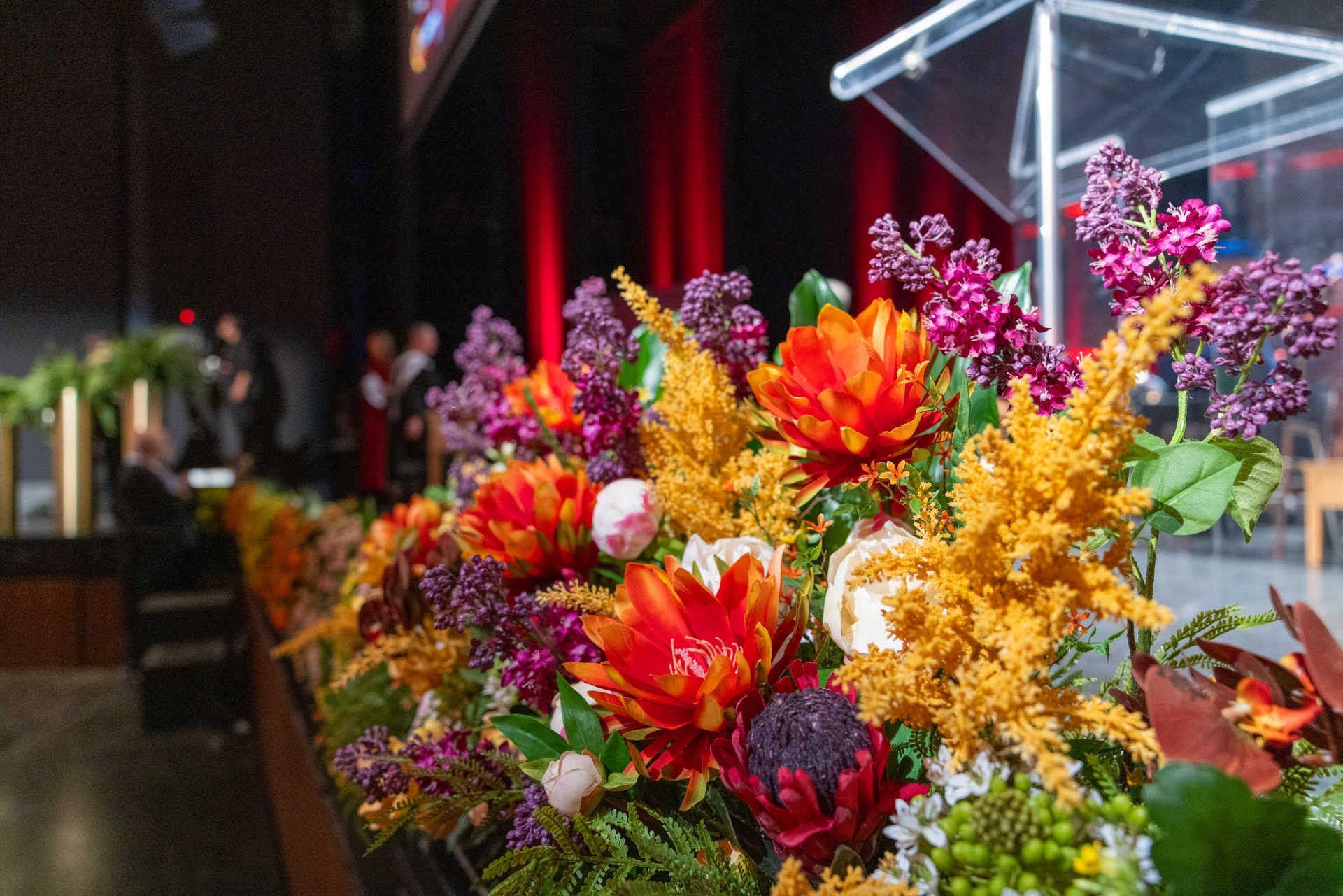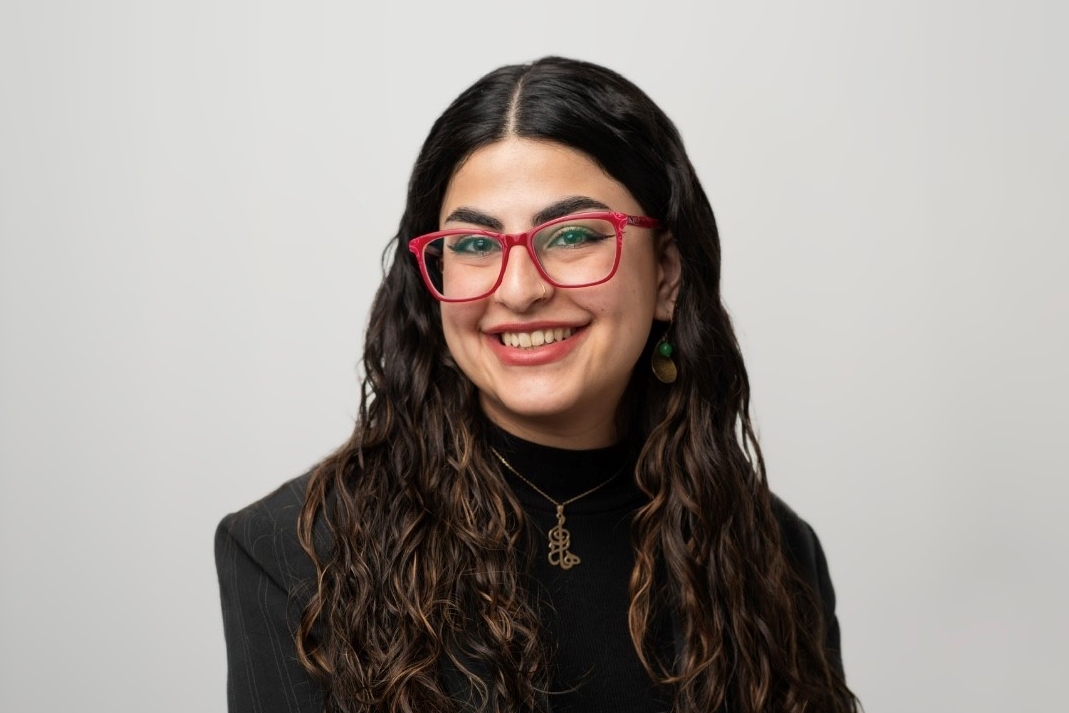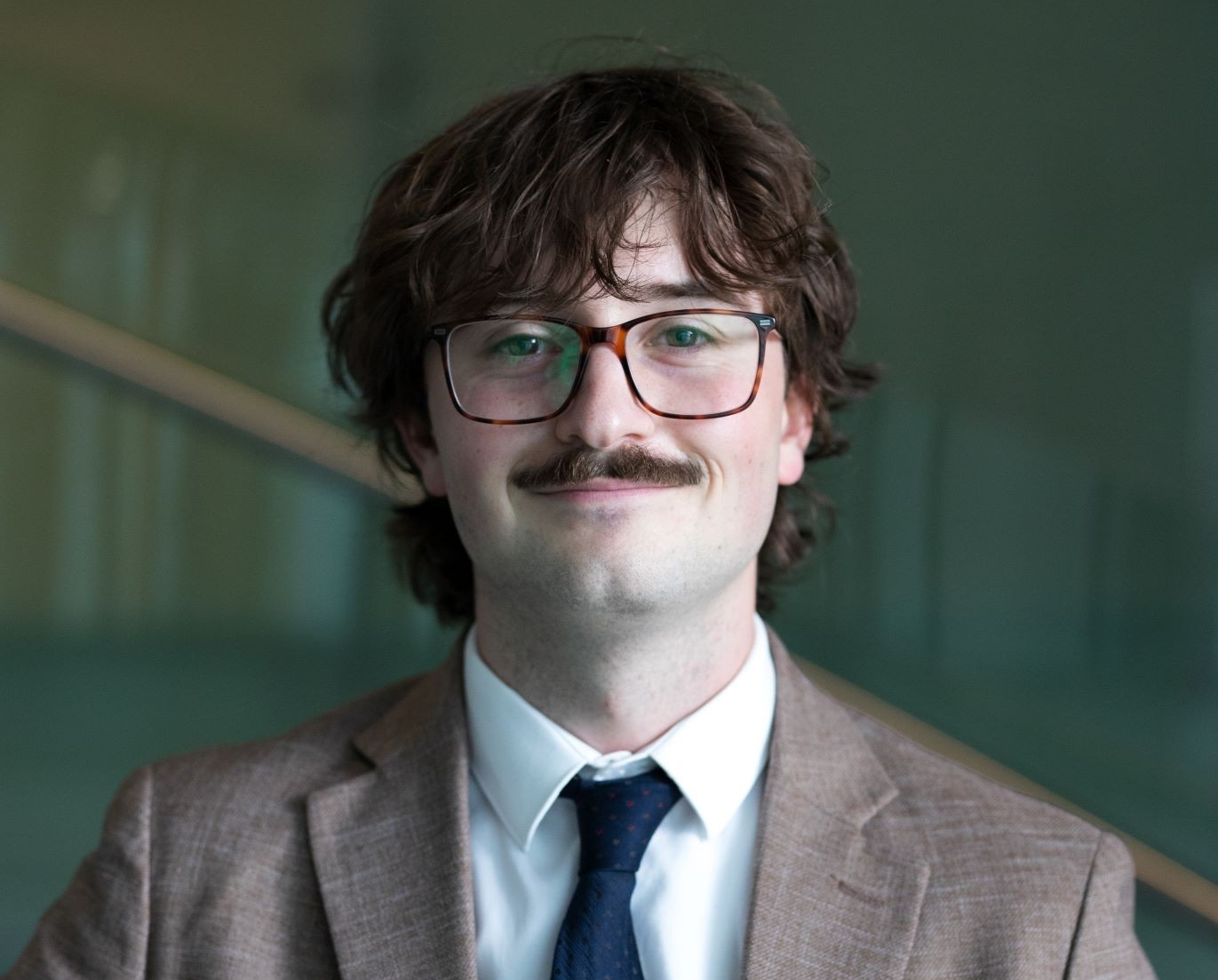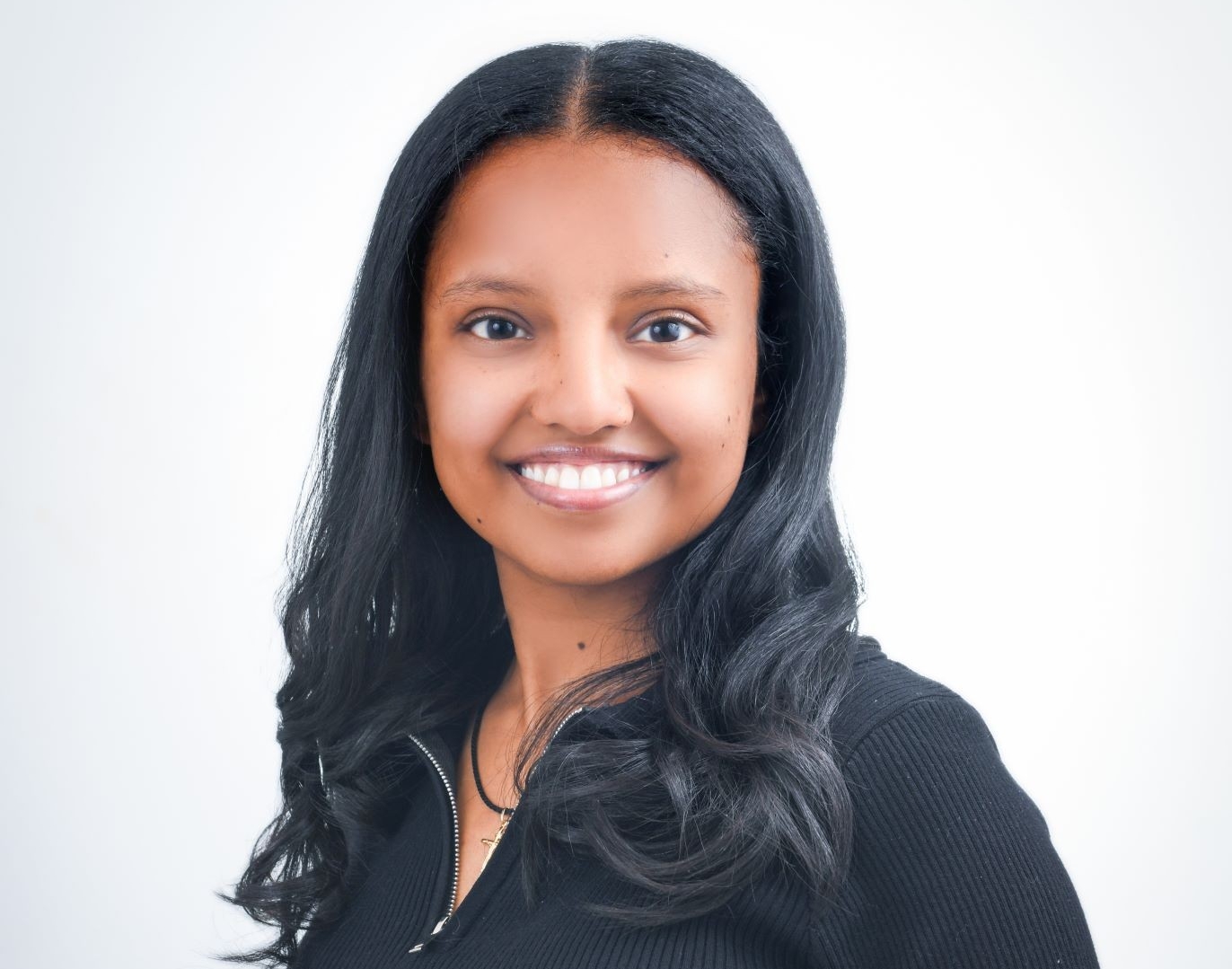Each convocation season, Concordia’s Faculty of Arts and Science celebrates the exceptional students chosen to represent their graduating class as valedictorians. These individuals have made a lasting impact through their academic excellence, leadership, and service to the community. As they prepare to take the stage on June 9, 2025, we have caught up with the four of them to learn more about the paths that brought them here—and what lies ahead for them.
Celebrating Faculty of Arts and Science Spring 2025 valedictorians

 “Stay curious, stay humble, and remember that asking the right questions is sometimes more powerful than having all the answers,” says Hana.
“Stay curious, stay humble, and remember that asking the right questions is sometimes more powerful than having all the answers,” says Hana.
Hana Sherafati Zanganeh
School of Community and Public Affairs
June 9, 10 a.m. ceremony
Born in Iran and raised between Toronto, Tehran, and eventually Montreal, Hana Sherafati Zanganeh is no stranger to adaptation—or resilience. Her family immigrated to Canada twice, once in early childhood and again during her teenage years, a time marked by cultural shifts, economic upheaval, and the challenge of learning a new language. Those experiences shaped her values of community, perseverance, and the power of social connection.
That journey led her to Concordia’s School of Community and Public Affairs, a program she describes as “tight knit and deeply impactful,” where she found mentorship, friendship, and the chance to explore the intersection of policy, activism, and identity. Whether recording podcasts for class, building community through student spaces, or engaging in hands-on learning, Sherafati Zanganeh made her mark—and found her voice.
Two lessons you learned at Concordia?
- You lose nothing by stepping out of your comfort zone. Early on, a friend encouraged me to get involved in the student association, reminding me I wouldn’t be alone. Saying yes led to friendships, meaningful work beyond the classroom, and growth I never expected. Sometimes all it takes is showing up once for everything to start shifting. It may be uncomfortable, but it is almost always worth it.
- The second lesson is the power of communication, grounded in kindness and trust. The support I received from professors, staff, and peers came from reaching out with openness and care. Real communication is not just speaking or listening, but showing up with empathy and building meaningful relationships.
What has been your Concordia highlight or standout moment?
What stands out the most to me are all the untraditional assignments and activities I got to do throughout my time at the SCPA. Instead of just writing essays or studying for exams, I was organizing public panels, creating podcast episodes, writing real policy proposals and connecting with community groups. I got to step outside the classroom and work directly with community organizations and nonprofits. I did an internship, helped organize events, and worked on a summer research project alongside a professor to organize an immersive exhibition celebrating the 45-year legacy of the SCPA. These kinds of experiences made my education feel real, grounded, and connected to the world around me. They also helped me grow in ways I never expected.
One piece of advice for future grads?
Get involved, even in small ways. Change doesn't happen all at once, but rather through consistent, meaningful actions. As students, we are always shaping our communities and ourselves. Your time here may feel short, but the impact you make can last long after graduation. Trust that your efforts matter, and that even the smallest act can be the beginning of something bigger.
 Charles-Etienne Sirois shares: “Take risks. If an opportunity scares you a little, it probably means you’ll learn a lot. And remember, the impact you have on people often starts with simply showing up and listening.”
Charles-Etienne Sirois shares: “Take risks. If an opportunity scares you a little, it probably means you’ll learn a lot. And remember, the impact you have on people often starts with simply showing up and listening.”
Charles-Etienne Sirois
Department of Economics
June 9, 3 p.m. ceremony
For Charles-Étienne Sirois, economics isn’t just about data and models—it’s a tool for creating a more sustainable and equitable world. Diagnosed with dyslexia in sixth grade, he developed a unique way of learning: grounded in observation, reflection, and deep curiosity. Those same qualities have guided him through transformative experiences across the globe—from the Sahara to the Amazon—fueling his passion for sustainability and development.
A proud French-Canadian and a pragmatic optimist, Sirois sees education as something lived: a balance between asking the right questions, learning from others, and putting theory into practice. Whether in class, in research, or over countless hours spent at the Hive Café, his Concordia journey was shaped by connection and purpose. He now heads to University College London to pursue a master’s in Economics and Policy of Energy and the Environment, with the goal of applying his knowledge to help Quebec manage its economy and resources for the good of both people and planet.
“Education is more than just theory,” he says. “It’s about the people you meet and the opportunities to apply what you learn to the real world.”
One piece of advice for future grads?
If it doesn't exist but you feel it should – build it. If a problem needs solving – solve it. Most importantly, do it with, and for, others. I hope that if you have learned anything from your degrees, it is that you are all capable of doing hard things. It is increasingly clear that we live in a time where there is no shortage of problems needing urgent attention. These will require compassionate and strong people. I have met many who fit such descriptions. I hope to meet many more. The world needs you, be there for it.
Two lessons you learned at Concordia?
- Do the hard work. Everything becomes marginally easier the more challenging things you’ve done.
- It doesn’t take much to get started. I remember, two years ago, sitting with a friend at the Hive, talking about how there could be more extra-curricular activities or research opportunities for undergraduates studying economics at Concordia. Two years later EconomicSense, the undergraduate research program I started with my co-founder following this discussion, has provided over 10 students with supervised research opportunities.
What does it mean for you to celebrate this milestone moment?
It’s an incredible honour. I am flooded with gratitude for the recognition, certainly, but above all else, for the people around me. The professors, the friends, and the family. These people have amplified my efforts in enumerable ways and have their share in this milestone. I’m excited to share this moment with them.
June 9, 8 p.m. ceremony (joint address)
For the first time in recent memory, the Faculty of Arts and Science will feature a joint valedictory address, delivered by Tsion Tesfu Abebe and Niraj Dayanandan—two students whose leadership and service have uplifted communities on campus and beyond.
 “Now that I have completed my studies, I can say with confidence that I would choose Concordia again, not just for its academic excellence, but for how it shaped me as an individual,” says Tsion.
“Now that I have completed my studies, I can say with confidence that I would choose Concordia again, not just for its academic excellence, but for how it shaped me as an individual,” says Tsion.
Tsion Tesfu Abebe
Department of Biology
June 9, 8 p.m. ceremony (joint address)
Originally from Hawassa, Ethiopia, Tsion came to Concordia in 2018 full of dreams. Raised by a single mother who believed deeply in the power of education and made many sacrifices to ensure her children had better opportunities, Tsion carried those values with her. But financial hardship forced her to pause her studies in 2020. After working to support her family and securing asylum, she returned to her degree in 2022. Since then, she has excelled—earning a spot on the Dean’s List year after year, receiving several research awards including the NSERC USRA, CUSRA (twice), the CQMF/QCAM Summer Research Award, the FQRNT supplement, and the Campaign for a New Millennium in-course bursary. She also had the opportunity to present her work at conferences.
Her scientific curiosity began early, through research at Hawassa University’s STEM Center, and grew at Concordia through her time in the Cuccia Lab. Outside the classroom, Tsion is deeply rooted in service. She has led Sunday school programs at her church since 2018, supported Ethiopian and Eritrean newcomers to Canada, and coordinated tutoring programs for children across Eastern Canada. Her journey is a testament to resilience, faith, and community. “This moment is a tribute to my mother, my community, and to the power of never giving up,” she says.
What made you choose Concordia?
A family friend, Concordia alumni, recommended the university to me while I was applying to study in Canada. I followed their advice with hope, not fully aware of how profoundly this decision would shape the course of my life. As an international student stepping into a new country and leaving everything familiar behind, Concordia welcomed me with open arms. Its vibrant diversity made me feel truly seen and embraced, not just as a student but as someone with a story and a future. Concordia didn’t just offer me an education; it gave me a new beginning and the foundation for a bright future. One of the things I appreciated most was the flexibility to explore beyond the boundaries of my program. I was also given the chance to present at research conferences, where my efforts were recognized and celebrated. Whether through faculty support, academic opportunities, or simply being encouraged to lead and contribute, I always felt that my achievements mattered.
Two lessons you learned at Concordia?
- Doors will not open unless you knock; don't hesitate to seek support when needed.
- Do something today that you won’t regret tomorrow, especially when it comes to assignments and deadlines.
One piece of advice for future grads?
Don’t compare yourself to anyone. Everyone’s journey is unique, and it is important to remember that you are not behind or ahead; you are just on your own unique path. Find a purpose that drives you, and embrace every step of your journey with gratitude and confidence.
 “Concordia is a lab for changemakers,” says Niraj. “If you have an idea, you can make it happen here. That was a big lesson for me: start before you’re ready.”
“Concordia is a lab for changemakers,” says Niraj. “If you have an idea, you can make it happen here. That was a big lesson for me: start before you’re ready.”
Niraj Dayanandan
Department of Geography, Planning and Environment
Loyola College for Diversity and Sustainability
June 9, 8 p.m. ceremony (joint address)
Niraj Dayanandan, who graduates from the Department of Geography, Planning and Environment, is known for his relentless energy and visionary ideas. Raised in Côte Saint-Luc by his Sri Lankan grandparents, and inspired by his brother Arun (BSc 17, MSc 22), Niraj credits his family’s sacrifices as his source of motivation. “Their dream was for my brother and me to have an education—and everything I’ve done is rooted in that.”
Originally passionate about science, Niraj later found his calling in city studies—combining his interests in research, sustainability, and community impact. At Concordia, he joined Carly Ziter’s lab, where he further developed his love for urban ecology. He went on to found student journals, establish equitable bursaries, and serve on the University Senate. Niraj also revived the Sustainability and Diversity Student Association and helped create a rooftop garden at the Loyola campus, demonstrating how student-led initiatives can leave a lasting legacy.
Three keys to a good education?
- Apply what you learn beyond the classroom: Theories are very useful, but the arts & sciences really thrive with the interdisciplinary application of what we learn directly in our environment.
- Explore the library’s resources: Both Vanier and Webster libraries were incredible resources during my time at Concordia. Whether it be the Innovation Lab, the guides under the “Finding…” tab, and the knowledgeable subject librarians, the library has been a fundamental pillar of my success in academics.
- Manage your time well: Getting involved in many parts of university life is only possible by maintaining an efficient calendar system, balancing academics and extracurriculars, and taking time to rest
Two lessons you learned at Concordia?
- Start doing before you know how: Concordia is an amazing laboratory to try projects and initiatives across disciplines. If you have an idea, do it before you even figure out all the details, and the gaps will naturally be filled over time.
- Collaboration is critical: It’s tempting to engage in activities alone. However, the most successful organizations and projects I’ve been a part of are a result of the diverse Montreal community.
One piece of advice for future grads?
Be the change you want to see, whether that be within your department, the university, or your community. It’s very easy to feel imposter syndrome when leading projects and initiatives, but we all have it in us. Every student I’ve met has the potential to become changemakers in society. As we experience unprecedent times in higher education, we should unite to build resilient, and empowered communities, to ensure that education, at its core, remains accessible to the next generation.
Learn more about the Spring 2025 Convocation ceremonies.

